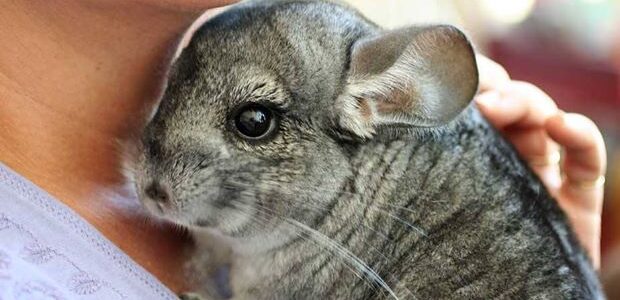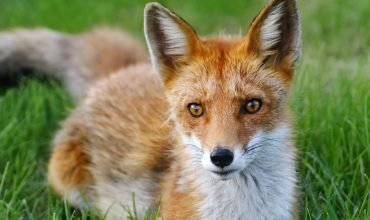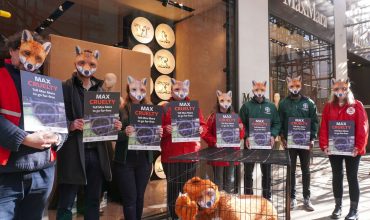2019 is off to an excellent start for the anti-fur movement as it is confirmed that Serbia has now banned fur farms after a 10-year phase-out. The enforcement of the ban is the successful result of a decade-long persistent struggle during which fur industry lobby groups consistently put pressure to reverse the ban.
The proposed ban, which came into force on 1 January 2019, was seriously under threat for much of 2018. Rattled by recent major advances by the anti-fur movement, the fur industry placed huge pressure on the Serbian government to delay the fur farming ban. Respect for Animals’ director Mark Glover travelled to Belgrade in June as part of a delegation from the Fur Free Alliance, to help convince politicians to keep the ban as planned and raised vital media awareness about the issue. Respect for Animals produced a letter to the Serbian Embassy, with was shared and signed online by thousands of compassionate people in the UK.
Chinchillas were the only animals kept for fur in Serbia. The intense battery cage system used on fur farms deprives chinchillas from the opportunity to express their natural behaviour – such as running and jumping – and causes severe welfare problems. International studies have shown behavioural disorders, such as stereotypies, pelt-biting and infant mortality, are highly common on chinchilla fur farms.
- Learn more about welfare problems on chinchilla fur farms.
Animal advocate groups worldwide persistently urged the Serbian government to stay committed to the 2009 Act and make an end to the widely-condemned practice of fur farming once and for all. To counter the campaign of misinformation spread by fur trade lobbyists in Serbia, Respect for Animals worked with Serbian Fur Free Alliance member organisation Freedom for Animals to provide the scientific facts on fur production and stress the need for a national ban.
Last June’s Make Fur History exhibition (pictured below) took place in Belgrade by Freedom for Animals, bringing together international experts, decision makers and journalists to address the negative impact of fur farming.
 Ultimately, Serbia’s government listened to the concerned public and animal rights groups and made an end to the unnecessary and cruel practice of fur production, sparing thousands of animals unimaginable suffering on Serbian fur farms.
Ultimately, Serbia’s government listened to the concerned public and animal rights groups and made an end to the unnecessary and cruel practice of fur production, sparing thousands of animals unimaginable suffering on Serbian fur farms.
Snezana Milovanovic, director of the Serbian animal protection organization Freedom for Animals, says:
“For 15 years now, Freedom for Animals has advocated for a fur-free Serbia by advancing and supporting legislation to abolish this brutal exploitation of animals. With the enforcement of the 2009 Animal Welfare Act, that makes it illegal to keep, reproduce, import, export and kill animals only for the production of fur, a great victory is finally achieved. Not only is this ban important for animals kept for fur production in Serbia, but also for the whole South East European region, and it signifies a major step forward for animal rights worldwide.”
Mark Glover, Respect for Animals said:
“This is good news for chinchillas and wretched news for the morally bankrupt fur industry. They threw a lot at getting this ban stopped. The fact that they have failed is testament to the hard work of everyone who has joined in this campaign. Serbia will no longer be an outpost of shocking cruelty against charming and gentle chinchillas. Thank you to those thousands of supporters of Respect for Animals who signed our letter to the Serbian Embassy. It’s now up to us to ensure the law is properly enforced by the government, but with this ban we take step a small step closer to our dream of a fur-free world.”
The ban in Serbia is in line with developments all across Europe, where in the past decades 14 countries have voted for legislation to end fur farming. In the past year alone, Norway, once world’s largest fox pelt producer, Belgium and Luxembourg adopted legislation to end fur farming. At this moment, fur farming bans are on the parliamentary agenda in Poland, Ireland, Lithuania, Denmark and Estonia.
Chinchillas and the fur trade
Chinchillas are rodents and are native to the Andes Mountains of northern Chile. Although often kept as pets, chinchillas were nearly driven to extinction because of the demand for their fur. To breed chinchillas for fur, the rodents were taken from their natural habitat in such large numbers that chinchillas are now an endangered species. Even though chinchillas are now protected by law in their natural habitat, the populations continue to decline. However, thousands of chinchillas are still bred commercially for their fur in several regions of Europe including Poland, Denmark, Hungary and in South-America (Brazil and Argentina).
The intense battery cage system used on fur farms deprives chinchillas of opportunities to express their natural behaviours – such as running and jumping – and causes severe welfare problems. International studies have shown stress-related behavioural disorders, such as pelt biting and infant mortality, are highly common on chinchilla fur farms.





